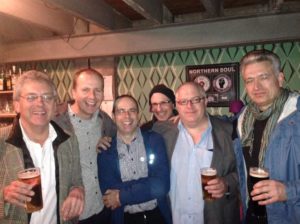‘The only jazz utopias we can know are the ones we have lost’—Krin Gabbard
‘More’s Utopia rests on an underclass, which resonates with jazz history, slavery…’—Alyn Shipton
At the wonderfully rich and varied (as well layered, nuanced and intermittently Guelphian) 4th Rhythm Changes international conference in jazz in Birmingham a number of different versions and glimpses of what might be thought of as the idea or problem of utopia in relation to jazz have been offered. Here are ones I heard or thought of from the four brilliant days. Others that you heard/spoke/glimpsed/played? There must be. Please do contribute! Together they give a sense of how utopian thinking can inform jazz studies, perhaps of the limits of utopian thinking, perhaps of the limits of utopian thinking in jazz and musicology.
- Space of jazz (especially in repressive regimes)—for instance, jazz happening in underground clubs, multiracial spaces in racist societies, jazz dance floor as site of pleasure and freedom. Also jazz and festivals, and the utopian possibility of transformation at festival.
- Jazz challenges in its early days: the music’s reception in the early 20th century in for example European countries to national categories of identity and national (cultural) institutions. Jazz changed what it meant to be German, French, British, say.
- Jazz as diasporic cultural practice and its relation to utopia (utopia = no place = transit culture, rooted in initially Atlantic middle passage). Also other later nomadic narratives.
- Related social cultural practices and metaphors of sociality (food, dancing, though I didn’t hear much about sex, which I thought strange).
- Jazz as music for social justice—the radical as well as liberal politics of the music. From civil rights to Breathless, as well as the music’s place in activism in countries outside the US.
- Jazz as transnational music, exploring and making dialogue between and across nations.
- Jazz and childhood: innocence (?), playfulness (we saw merry-go-rounds and swings at jazz festivals–yes, jazz swings!), toy pianos.
- Utopia not as perfect but as imperfect: flaunted imperfection of (instrumental) technique in some musics (some free improvisation, some trad jazz).
- Jazz as dystopian sound: one early reviewer described it as possessing ‘the buzzing rattle of a machine gun, only not so musical’.
- Utopian strands in the music itself? Something utopian in the sounds themselves, the dialogic process of the bandstand, the collective, and in the (live) music’s improvisational impermanence.
- & magic? Black magic?
And I thought of this too: what about the conference itself as a utopian intellectual (social, cultural) compressed time-space—we here at Rhythm Changes are in a ‘good place’ for jazz research, one we thought up (dreamed) then made with you over the past 6-7 years. (OK, I am writing this at the very end of the conference so am both bleary-eyed and wearing rose-tinted glasses: such a view needs qualifying by reminding ourselves that utopia is also functionally exclusive; we need to acknowledge the event’s dominant whiteness and the notable male presence of delegates.)

